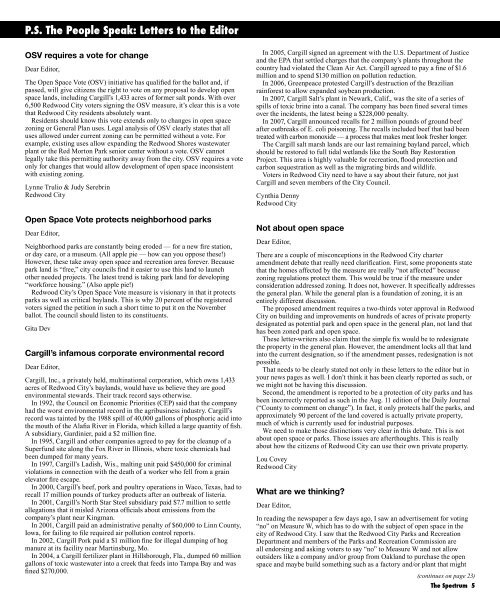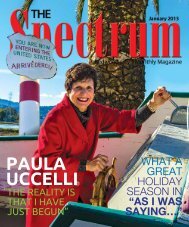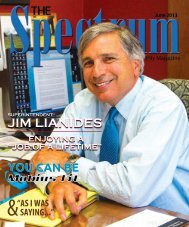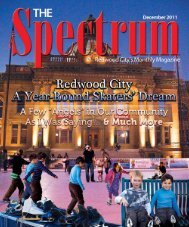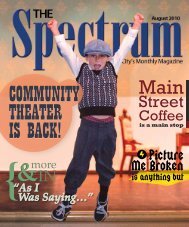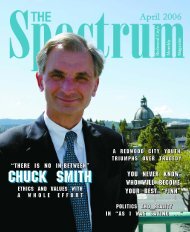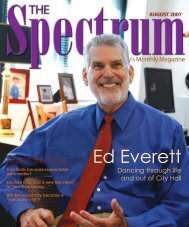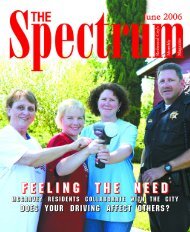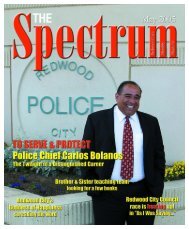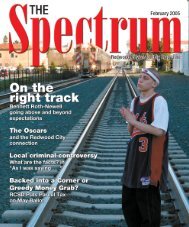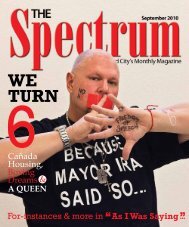Service League - The Spectrum Magazine - Redwood City's Monthly ...
Service League - The Spectrum Magazine - Redwood City's Monthly ...
Service League - The Spectrum Magazine - Redwood City's Monthly ...
Create successful ePaper yourself
Turn your PDF publications into a flip-book with our unique Google optimized e-Paper software.
P.S. <strong>The</strong> People Speak: Letters to the Editor<br />
OSV requires a vote for change<br />
Dear Editor,<br />
<strong>The</strong> Open Space Vote (OSV) initiative has qualified for the ballot and, if<br />
passed, will give citizens the right to vote on any proposal to develop open<br />
space lands, including Cargill’s 1,433 acres of former salt ponds. With over<br />
6,500 <strong>Redwood</strong> City voters signing the OSV measure, it’s clear this is a vote<br />
that <strong>Redwood</strong> City residents absolutely want.<br />
Residents should know this vote extends only to changes in open space<br />
zoning or General Plan uses. Legal analysis of OSV clearly states that all<br />
uses allowed under current zoning can be permitted without a vote. For<br />
example, existing uses allow expanding the <strong>Redwood</strong> Shores wastewater<br />
plant or the Red Morton Park senior center without a vote. OSV cannot<br />
legally take this permitting authority away from the city. OSV requires a vote<br />
only for changes that would allow development of open space inconsistent<br />
with existing zoning.<br />
Lynne Trulio & Judy Serebrin<br />
<strong>Redwood</strong> City<br />
Open Space Vote protects neighborhood parks<br />
Dear Editor,<br />
Neighborhood parks are constantly being eroded — for a new fire station,<br />
or day care, or a museum. (All apple pie — how can you oppose these!)<br />
However, these take away open space and recreation area forever. Because<br />
park land is “free,” city councils find it easier to use this land to launch<br />
other needed projects. <strong>The</strong> latest trend is taking park land for developing<br />
“workforce housing.” (Also apple pie!)<br />
<strong>Redwood</strong> City’s Open Space Vote measure is visionary in that it protects<br />
parks as well as critical baylands. This is why 20 percent of the registered<br />
voters signed the petition in such a short time to put it on the November<br />
ballot. <strong>The</strong> council should listen to its constituents.<br />
Gita Dev<br />
Cargill’s infamous corporate environmental record<br />
Dear Editor,<br />
Cargill, Inc., a privately held, multinational corporation, which owns 1,433<br />
acres of <strong>Redwood</strong> City’s baylands, would have us believe they are good<br />
environmental stewards. <strong>The</strong>ir track record says otherwise.<br />
In 1992, the Council on Economic Priorities (CEP) said that the company<br />
had the worst environmental record in the agribusiness industry. Cargill’s<br />
record was tainted by the 1988 spill of 40,000 gallons of phosphoric acid into<br />
the mouth of the Alafia River in Florida, which killed a large quantity of fish.<br />
A subsidiary, Gardinier, paid a $2 million fine.<br />
In 1995, Cargill and other companies agreed to pay for the cleanup of a<br />
Superfund site along the Fox River in Illinois, where toxic chemicals had<br />
been dumped for many years.<br />
In 1997, Cargill’s Ladish, Wis., malting unit paid $450,000 for criminal<br />
violations in connection with the death of a worker who fell from a grain<br />
elevator fire escape.<br />
In 2000, Cargill’s beef, pork and poultry operations in Waco, Texas, had to<br />
recall 17 million pounds of turkey products after an outbreak of listeria.<br />
In 2001, Cargill’s North Star Steel subsidiary paid $7.7 million to settle<br />
allegations that it misled Arizona officials about emissions from the<br />
company’s plant near Kingman.<br />
In 2001, Cargill paid an administrative penalty of $60,000 to Linn County,<br />
Iowa, for failing to file required air pollution control reports.<br />
In 2002, Cargill Pork paid a $1 million fine for illegal dumping of hog<br />
manure at its facility near Martinsburg, Mo.<br />
In 2004, a Cargill fertilizer plant in Hillsborough, Fla., dumped 60 million<br />
gallons of toxic wastewater into a creek that feeds into Tampa Bay and was<br />
fined $270,000.<br />
In 2005, Cargill signed an agreement with the U.S. Department of Justice<br />
and the EPA that settled charges that the company’s plants throughout the<br />
country had violated the Clean Air Act. Cargill agreed to pay a fine of $1.6<br />
million and to spend $130 million on pollution reduction.<br />
In 2006, Greenpeace protested Cargill’s destruction of the Brazilian<br />
rainforest to allow expanded soybean production.<br />
In 2007, Cargill Salt’s plant in Newark, Calif., was the site of a series of<br />
spills of toxic brine into a canal. <strong>The</strong> company has been fined several times<br />
over the incidents, the latest being a $228,000 penalty.<br />
In 2007, Cargill announced recalls for 2 million pounds of ground beef<br />
after outbreaks of E. coli poisoning. <strong>The</strong> recalls included beef that had been<br />
treated with carbon monoxide — a process that makes meat look fresher longer.<br />
<strong>The</strong> Cargill salt marsh lands are our last remaining bayland parcel, which<br />
should be restored to full tidal wetlands like the South Bay Restoration<br />
Project. This area is highly valuable for recreation, flood protection and<br />
carbon sequestration as well as the migrating birds and wildlife.<br />
Voters in <strong>Redwood</strong> City need to have a say about their future, not just<br />
Cargill and seven members of the City Council.<br />
Cynthia Denny<br />
<strong>Redwood</strong> City<br />
Not about open space<br />
Dear Editor,<br />
<strong>The</strong>re are a couple of misconceptions in the <strong>Redwood</strong> City charter<br />
amendment debate that really need clarification. First, some proponents state<br />
that the homes affected by the measure are really “not affected” because<br />
zoning regulations protect them. This would be true if the measure under<br />
consideration addressed zoning. It does not, however. It specifically addresses<br />
the general plan. While the general plan is a foundation of zoning, it is an<br />
entirely different discussion.<br />
<strong>The</strong> proposed amendment requires a two-thirds voter approval in <strong>Redwood</strong><br />
City on building and improvements on hundreds of acres of private property<br />
designated as potential park and open space in the general plan, not land that<br />
has been zoned park and open space.<br />
<strong>The</strong>se letter-writers also claim that the simple fix would be to redesignate<br />
the property in the general plan. However, the amendment locks all that land<br />
into the current designation, so if the amendment passes, redesignation is not<br />
possible.<br />
That needs to be clearly stated not only in these letters to the editor but in<br />
your news pages as well. I don’t think it has been clearly reported as such, or<br />
we might not be having this discussion.<br />
Second, the amendment is reported to be a protection of city parks and has<br />
been incorrectly reported as such in the Aug. 11 edition of the Daily Journal<br />
(“County to comment on change”). In fact, it only protects half the parks, and<br />
approximately 90 percent of the land covered is actually private property,<br />
much of which is currently used for industrial purposes.<br />
We need to make those distinctions very clear in this debate. This is not<br />
about open space or parks. Those issues are afterthoughts. This is really<br />
about how the citizens of <strong>Redwood</strong> City can use their own private property.<br />
Lou Covey<br />
<strong>Redwood</strong> City<br />
What are we thinking?<br />
Dear Editor,<br />
In reading the newspaper a few days ago, I saw an advertisement for voting<br />
“no” on Measure W, which has to do with the subject of open space in the<br />
city of <strong>Redwood</strong> City. I saw that the <strong>Redwood</strong> City Parks and Recreation<br />
Department and members of the Parks and Recreation Commission are<br />
all endorsing and asking voters to say “no” to Measure W and not allow<br />
outsiders like a company and/or group from Oakland to purchase the open<br />
space and maybe build something such as a factory and/or plant that might<br />
(continues on page 23)<br />
<strong>The</strong> <strong>Spectrum</strong>


